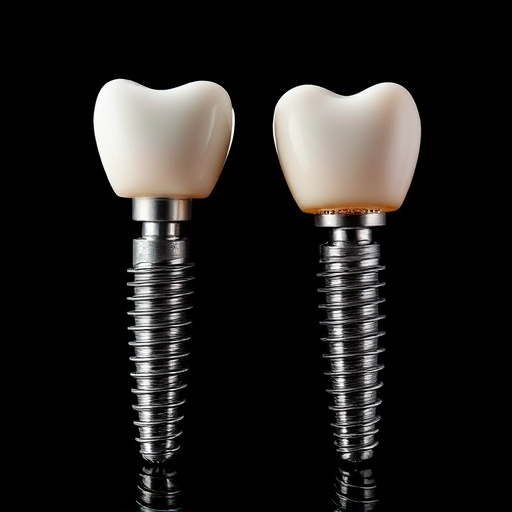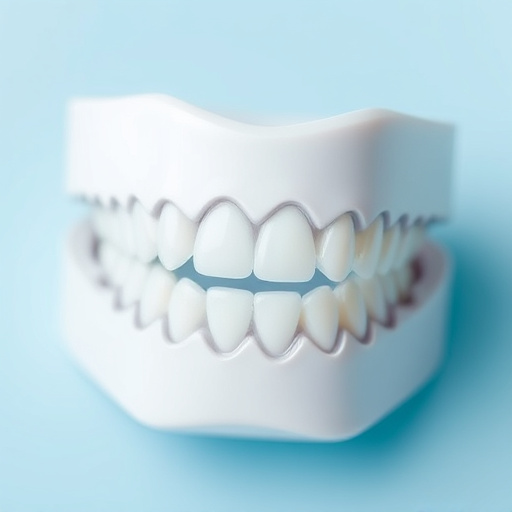Tooth sensitivity treatment involves addressing exposed dentin due to worn enamel or receding gums. Dental bonding, using composite resin, is a non-invasive procedure that covers sensitive areas, providing relief from hot/cold foods and air. Effective for mild to moderate cases, it's suitable for children and adults, offering an alternative to crowns or extractions. Comprehensive dental care ensures long-term protection and repair, enhancing oral health and smile confidence.
Tooth sensitivity can be a painful experience, but effective treatment options are available. If you’re suffering from tooth sensitivity, dental bonding might be the solution you’ve been searching for. This procedure involves applying a composite resin material to the affected area, providing instant relief and lasting results. By understanding the causes of tooth sensitivity—such as enamel wear, gingival recession, or dental damage—and exploring various treatment methods, including dental bonding, you can reclaim comfort in your smile.
- Understanding Tooth Sensitivity and Its Causes
- Dental Bonding: A Procedure for Sensitive Teeth
- Effective Management and Relief for Tooth Sensitivity
Understanding Tooth Sensitivity and Its Causes

Tooth sensitivity, a common issue affecting many individuals, is characterized by sharp pain or discomfort triggered by specific stimuli like hot or cold foods, sweet treats, or even cold air. This sensitivity often arises from the exposure of dentin, a layer beneath the enamel that contains tiny tubes connected to the tooth’s nerves. These tubes can become exposed due to factors such as tooth wear, receding gums, or dental damage.
Several causes contribute to tooth sensitivity, including brushing too aggressively, consuming highly acidic foods and beverages, and even certain oral care products. In many cases, a family dentistry visit can help identify the root cause. Emergency dental care may be recommended for sudden, severe sensitivity. One effective treatment option is dental bonding, which involves applying a composite resin material to cover and protect exposed dentin, thus providing relief from sensitive teeth.
Dental Bonding: A Procedure for Sensitive Teeth

Dental bonding is a cosmetic dental procedure that can be an effective tooth sensitivity treatment for those experiencing discomfort due to exposed dentin or root surfaces. This non-invasive technique involves applying a tooth-colored resin material directly to the affected areas of the teeth. The resin is then cured with a special light, hardening it and providing a protective layer over sensitive parts of the teeth.
By bonding the enamel together and sealing any exposed areas, this procedure helps to reduce sensitivity caused by factors like hot or cold foods, sweet treats, or even cold air. It’s an excellent alternative for those seeking a less drastic approach compared to dental crowns or tooth extractions, especially when addressing mild to moderate tooth sensitivity issues in both children’s dentistry and adult patients.
Effective Management and Relief for Tooth Sensitivity

Tooth sensitivity can be effectively managed and relieved through various dental procedures, offering a significant improvement in oral comfort for patients. One of the commonly recommended treatments is dental bonding, a process that has gained popularity due to its ability to provide long-lasting results. This procedure involves applying a tooth-colored resin material to the exposed dentin, sealing the tubules and reducing the sensitivity. By blocking the pathways through which hot or cold stimuli can reach the nerve, dental bonding offers immediate relief from sudden temperature changes, making it an excellent solution for those seeking tooth sensitivity treatment.
Comprehensive dental care often includes restorative dentistry techniques like bonding, ensuring not just symptom alleviation but also tooth repair and long-term protection. This approach is particularly beneficial for individuals with receding gums or enamel wear, as it provides a durable and aesthetically pleasing solution. Through comprehensive dental care, patients can achieve better oral health and confidence in their smile.
Tooth sensitivity treatment can effectively manage discomfort, with dental bonding procedures offering a reliable solution. By understanding the causes of tooth sensitivity, such as enamel wear or gum recession, individuals can make informed decisions about their oral health. Dental bonding involves applying a composite resin to the exposed dentin, quickly reducing sensitivity and restoring comfort. This non-invasive approach is just one of several strategies to combat tooth sensitivity, ensuring folks can enjoy their favorite foods without wincing.














